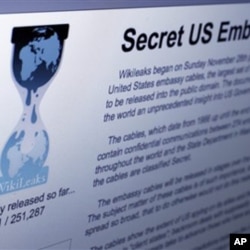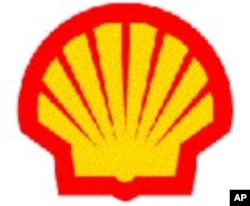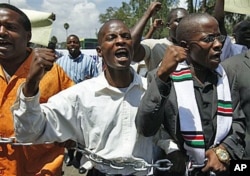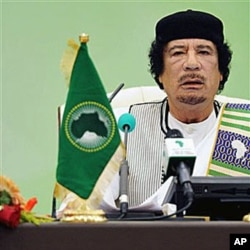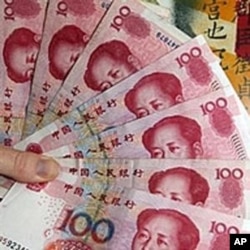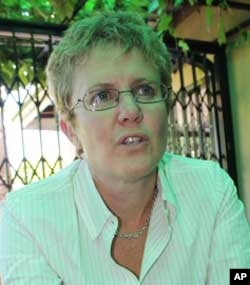The WikiLeaks website is continuing to publish thousands of United States government secrets on the internet. The classified documents reveal secret correspondence between the US State Department in Washington, DC and its 270 embassies across the globe. The revelations are embarrassing and angering Washington and governments and political leaders worldwide - including in Africa.
In some of the communications – known as cables – American diplomats criticize some of the continent’s most prominent personalities. Zimbabwean Prime Minister Morgan Tsvangirai, for example, is described as “flawed” and “indecisive and closed-minded,” according to a leak reported in the New York Times.
While some observers have dismissed the WikiLeaks disclosures as mostly “gossip, personal insults and innuendo,” others say some of them could have serious consequences for Africa.
Previously secret cables, for examples, show the US government asked its envoys to gather intelligence on African United Nations representatives, including South Africa’s Baso Sangqu and Uganda's Ruhakana Rugunda; that Libyan leader Muammar Gaddafi was prepared to risk a nuclear disaster because he was angry with the UN, and that Kenya in 2008 covertly transported Ukrainian tanks to south Sudan.
“The WikiLeaks revelations have sent shudders through the international diplomatic community, there’s no doubt about that,” says Liesl Louw-Vaudran, the editor of The African.org, a web magazine with the Pretoria-based Institute for Security Studies.
“One can’t minimize the fact that these are confidential cables and no US ambassador in any African country ever intended it to be read by the entire world. So I don’t think it’s feasible just to dismiss the leaks as gossip,” says Louw-Vaudran, who works throughout Africa, and also lectures international journalism at one of South Africa’s top universities.
Nigeria
Louw-Vaudran, who’s closely monitoring WikiLeaks’ publication of African-related material, says Nigeria is the “most mentioned” African country in the US cables released so far. “The US interest in especially Nigeria is entirely logical,” she comments.
“Any country that has dealings with Africa would focus on Nigeria, number one, because it’s Africa’s biggest oil producer; the US gets a large amount of oil from there. There are the (security) difficulties with the Niger Delta – the oil-producing area. We know that oil production has been cut by almost a third in the last couple of months because of rebel activity,” Louw-Vaudran explains.
The Guardian newspaper reports that US diplomatic cables obtained by WikiLeaks reveal that the Royal Dutch Shell oil giant has “seconded” officials to key Nigerian ministries, giving it access to politicians' “every move.”
Louw-Vaudran says, “That the big oil firms have close relationships – some would say corrupt relationships - with Nigerian politicians is well known. But that one specific company would enjoy such a massive advantage in Nigeria, by enjoying a presence in government ministries, is shocking.”
Kenya
A lot of the secret diplomatic chatter revealed by WikiLeaks focuses on Kenya. Again, this doesn’t surprise Louw-Vaudran, given that the country is East Africa’s most powerful economy and is Washington’s key ally against terrorism in the region, and “given the behavior” of successive American envoys to Nairobi.
“The UK and the US ambassadors in Kenya are extremely outspoken, and in fact, they are quite listened to and quoted in the (Kenyan) media,” she says.
One US cable describes Kenya as a “swamp of flourishing corruption” and other cables speak of President Mwai Kibaki and Prime Minister Raila Odinga with “disdain,” according to German magazine Der Spiegel.
Louw-Vaudran doesn’t think information such as this will have a “major impact” on Washington-Nairobi relations. “Inside themselves, Kibaki and Odinga will probably be smarting for a while, but all these revelations of massive corruption schemes and who’s involved are already out there. They’ve been uncovered by Kenya’s media, and are even listed in a book (Michaela Wrong’s Our Turn To Eat).”
Another cable released by WikiLeaks, according to the Guardian, contains evidence, from satellite photographs, that a shipment of tanks from Ukraine was transported through Kenya to south Sudan in 2008. At the time, Kenyan officials insisted the weapons were for its military.
Observers say this leak is likely to further strain Nairobi’s already fraught relationship with Khartoum.
Libya
Secret American communiqués as revealed by WikiLeaks and reported by the Guardian show that Libya’s Colonel Muammar Gaddafi in late 2009 left radioactive uranium poorly protected. That in turn raised concern that it could be stolen by terrorists, risking a nuclear disaster that could have resulted in the deaths of many people.
For a significant period of time, the material that could have been used to make a nuclear bomb was guarded by a single soldier. Gaddafi’s motivation for acting so “irresponsibly,” according to the confidential cable, was that he was angry at the UN’s refusal to allow him to pitch his tent outside the organization’s headquarters in New York at an earlier UN meeting.
After intense lobbying from US and Russian diplomats, Libyan officials finally allowed a Russian plane to load the uranium and transport it to safety, after initially refusing clearance for the aircraft to land in Libya.
Louw-Vaudran describes this news as “very shocking, (but) I think African governments have long been aware that (Gaddafi) is a very unpredictable character; untrustworthy …”
Because most African leaders consider Gaddafi to be “a bit of a liability to the continent and its image as a whole,” says the analyst, the African Union has “sidelined” him “to a degree” and limited him to a “sort of symbolic leadership role, where he hosts summits, for example, but isn’t allowed to push through his plans for a single ‘United States of Africa.’”
In another US diplomatic wire from 2008 leaked to WikiLeaks, and seen by the Guardian, it’s said that Ugandan President Yoweri Museveni feared being assassinated by Gaddafi, because the two had argued about the Libyan leader’s vision of a united Africa. Museveni was apparently afraid that Gaddafi would attack his plane.
“Museveni’s fears may sound far-fetched, but they don’t surprise me,” says Louw-Vaudran. “I don’t think any African leader has any illusions of the type of person you’re dealing with in Gaddafi. When you see him at these summits, the way he dresses, surrounded by all these heavily armed and attractive female bodyguards – it’s crazy - and the things he says when he goes on trips to Europe are absolutely ridiculous.”
US gathering information on prominent Africans
According to the Guardian, cables published by Wikileaks also reveal that Washington has instructed US diplomats to gather information on various countries’ UN delegates – including African UN representatives - and collect their email passwords, credit card account numbers, frequent flyer account numbers and work schedules.
The Guardian reports that a secret diplomatic note sent to American diplomatic missions in the name of Secretary of State Hilary Clinton in April 2009 sought personal details – including fingerprints, DNA and iris scans – of leaders in Burkina Faso, Burundi, Cape Verde, Chad, Democratic Republic of Congo, Gambia, Mali, Mauritania, Niger, Rwanda and Senegal - including major political, military, business and religious figures.
“It seems surprising, but I suppose that’s just the tip of the iceberg of things that we don’t know about covert operations or the (US) secret service and how it operates throughout Africa,” Louw-Vaudran states, adding, “Now many people involved in intelligence analysis will tell you that a significant portion of many countries’ – not just the US’s – embassies are people who are more aligned to secret service than foreign service … But to spy on the UN does take it a bit far.”
China in Africa
A US cable obtained by WikiLeaks and reported by the Guardian reveals that some African states, including Nigeria, have complained to Washington that China is “losing friends worldwide” because of its “aggression.”
China has been pursuing close relationships with African states in recent years, offering lucrative infrastructure deals in exchange for access to African markets and resources such as oil.
In the secret communication, a Nigerian official suggests poorer countries are being “coerced” into aid-for-resources deals. Other cables reported by the New York Times suggest some African diplomats are “suspicious” and “resentful” of China’s role in their countries.
Louw-Vaudran says, “I think a lot of Africans have got suspicions of China, but I also think that Africa’s former colonial powers and the continent’s traditional trading partners in Europe have been very, very good at demonizing the Chinese. Somehow it seems as if some of the African leaders have bought that.”
But, she says some African leaders are being “very hypocritical” in “attacking and criticizing” China “behind Beijing’s back” to America, “because they love to take money from China for infrastructure projects in return for mineral resources, and so on. If I was the Chinese, I’d be pretty upset by what WikiLeaks has revealed in this respect.”
But some US documents given to WikiLeaks and published by the Guardian also reveal African support for China. In one cable, for example, a US diplomat reports Julius Ole Sunkuli, Kenya’s ambassador to China, as saying “Africa was better off thanks to China’s practical, bilateral approach to development assistance and (Sunkuli) was concerned that this would be changed by ‘western’ interference.”
Reaction in Africa
Louw-Vaudran says she’s spoken to many people “from all walks of life” around Africa to get their reaction to the information so far revealed by WikiLeaks.
“I think many Africans are a little bit disgusted, a little bit shocked, at the sort of flippant way that these American diplomats are talking about, ultimately, African heads of state,” she says.
Louw-Vaudran comments that while many Africans also find some of the leaks “very humorous indeed,” they’re also now questioning the role of US diplomats, given all the “meddling chitchat” contained within the WikiLeaks revelations.
“When Africans realize that the Americans are concerned that (Libyan leader Muammar) Gaddafi is sleeping with a ‘voluptuous blonde’ Ukrainian nurse, it makes them think, ‘oh, US diplomats get paid to collect gossip and to make personal insults,’” she says.
“People say, ‘but what are these ambassadors actually doing here; sitting around here and saying, oh, Muammar Gaddafi is sleeping with this one and that one and that (Italian Prime Minister Silvio) Berlusconi has parties. It almost degrades their job as highly paid ambassadors.”
Consequences for US and Africa
Louw-Vaudran says “the whole WikiLeaks debacle” is “something that certainly embarrasses the US.” She adds that the incident is “once again forcing Africans to question the US’s role” on their continent, and to “voice serious doubts about the US.”
The leaks, Louw-Vaudran says, “beg the question, and Africans are asking this logical question, that if the US cannot protect its secrets, how on earth will they be able to protect people from terrorist attacks, for example?”
She says the spilling of US government secrets to WikiLeaks is yet another “severe blow to America’s image as the superpower of the world. It further destroys the aura of invincibility that the US once had – especially in Africa – and that we’ve seen eroded since the 9/11 attacks and invasion of Iraq.”
Louw-Vaudran says many of her contacts across Africa, from high-ranking government officials to prominent businesspeople, are not surprised by the revelations contained within the WikiLeaks cables, but are rather “shocked” that such a powerful country as the US failed to prevent such a “huge leak” from occurring.
“We will probably see the US government being much more on guard regarding the information it gathers, and where and how it is stored, how it is channeled and who has access to it,” she comments.
Louw-Vaudran adds that the WikiLeaks revelations are going to make not only Washington, but governments around the world, “very jittery” and “even paranoid.”
“Governments feel that they can’t control information in this globalized, internet society, and that makes them extremely anxious, and that makes them run around doing things like trying to find ways of blocking websites….”
But, she says “in this age of computer hackers and so on, and with so many computer savvy people out there, there’s no way that any government can ever be totally sure that they have measures to prevent information from leaking out.”
Louw-Vaudran warns that the WikiLeaks incident could inspire some states – especially in Africa - to pass laws to crack down “too excessively” on access to information, “which could impact very negatively on people’s right to know most of what their governments are up to.”
She says, “It’ll give a justification to governments to say, ‘look what happened to the US; all we’re doing is protecting our national interests by preventing what happened to the US from happening to us. It’s very scary.”
Louw-Vaudran’s convinced the leak will result in “some changes” in the ways in which diplomats in Africa interact with presidents, government members, and so on.
“From now on, when there is a meeting and an ambassador is invited for dinner for a confidential chat, it will be a bit difficult to have that confidential chat, because there’s no guarantee that anything that is being said won’t be splashed over the newspapers tomorrow.”
On the other hand, she hopes that this “temporary paranoia” doesn’t prevent ambassadors and governments from sharing confidential information that could save lives.
“Gossip and insult is one thing, but if this type of information isn’t shared in good time, then we have a big problem.”




